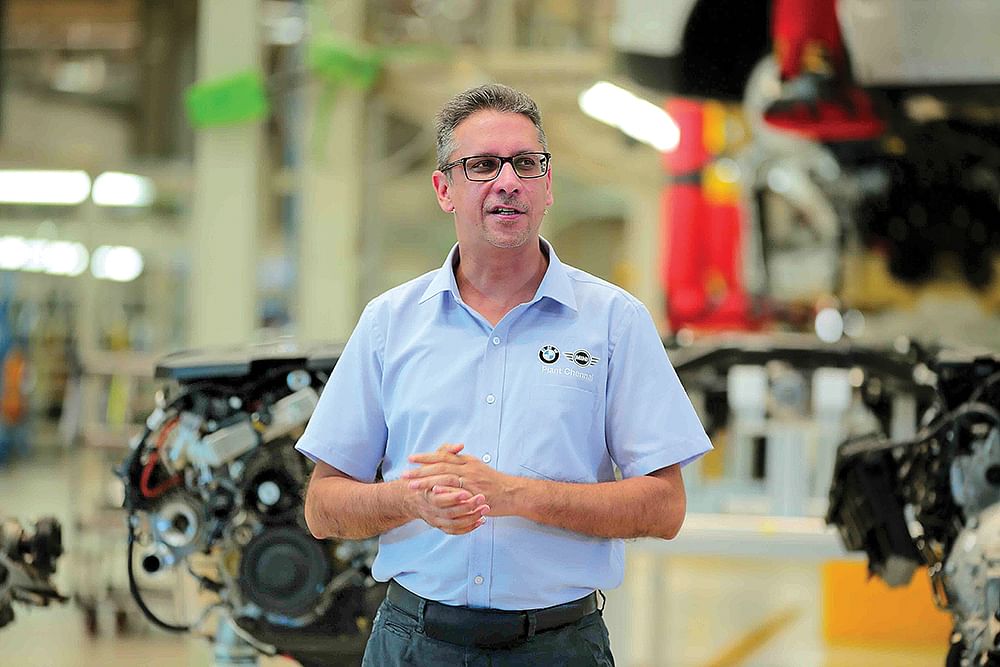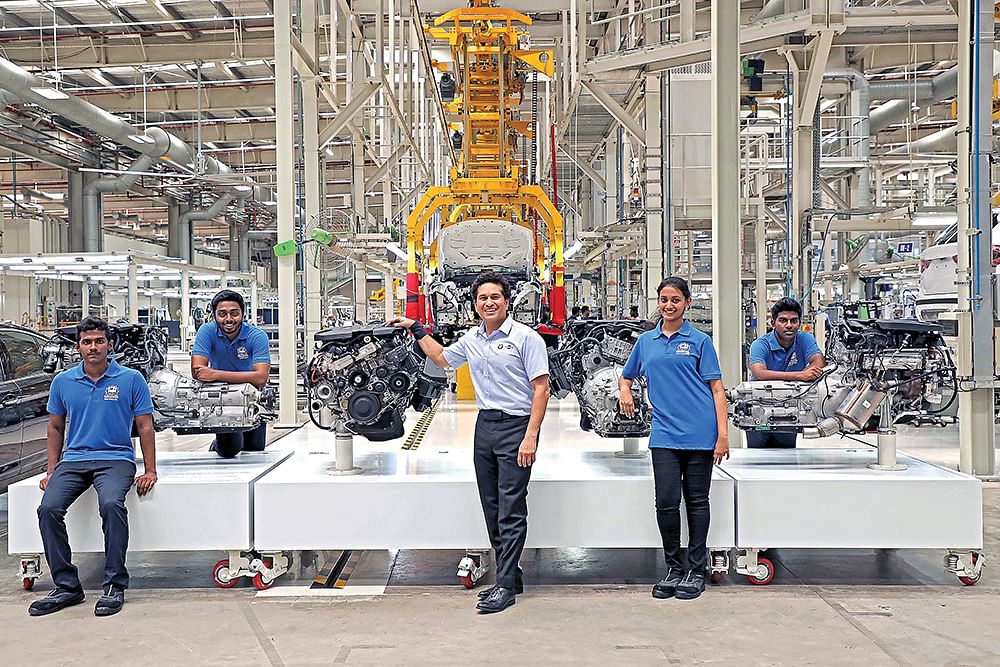BMW India plots new strategy to accelerate sales
For BMW India, it’s not just about growing volumes but creating new segments in a niche market.
Of the near-3.3 million unit passenger vehicle market in India, the luxury car market constitutes a little more than one percent of the overall PV market. In comparison, in developed markets, the ratio stands at around five to seven percent. In CY2017, total reported luxury car sales in India were 39,424 units, of which BMW India sold 9,800 units or 25 percent. The company, which is the current No. 2, after Mercedes-Benz India, is betting on growing the market by introducing new models that will not only expand its portfolio but also create new segments.
Speaking to Autocar Professional in Chennai, Vikram Pawah, president, BMW Group India, said the country’s taxation policy is not at par with global markets and disallows the luxury vehicle segment from achieving its real potential. A case in point is the recent customs duty hike on CKD units from 7.5 / 10 percent to 15 percent, along with an increase in duty on vehicle parts, which are an element of the CKD kits, from 10 percent to 15 percent. What’s more, the basic customs duty on CBUs has gone up from 20 to 25 percent.
Localisation and growth
A higher level of localisation also means a pathway to competitive pricing. BMW India currently has a localisation level of around 50 percent for its product range but Pawah believes that increasing localisation is not about saving costs, but more about convenience and flexibility. He says, “When the government raised the CKD duty, our dialogue with the government was that the decision was against ‘Make in India’. You cannot create everything immediately. In this instance, we cannot create the demand immediately; it takes time, especially for premium vehicles. For increasing localisation levels, demand will need to grow. We have already localised 50 percent. If we are allowed to import more, it will create more demand, and we will obviously localise more. It is not that the cost of duty that makes us localise, it is about the convenience and flexibility. Allow us to bring in more, let us have a level-playing field with the world. India has got one of the highest (customs) duties in the world; we request the government to bring it down and see how it helps the industry grow.”

Vikram Pawah, president, BMW Group India: "Allow us to bring in more, let us have a level-playing field with the world. India has got one of the highest (customs) duties in the world. We request the government to bring it down and see how it helps the industry grow.”
In FY2016, growth in the luxury vehicle segment was impacted adversely due to policy changes (GST, demonetisation) that saw overall industry de-grow 4.24 percent. CY2017 sales grew 13.44 percent.
“My strategy is to grow the market, it is not about being number one. It is all about growing the market like we did in 2007, when we first entered India. Last year, when we said we want grow the market and have a strategy about growing it, coincidentally the market grew after a long time. The market was slow over the past five years. We are confident that we will grow it again this year,” commented Pawah.
“For me it is all about the potential of India. India’s taxation policy is not at par with the world. That’s why sales of premium cars are so few in India. I am no economist but it would help to calculate and see if the tariffs were brought down to worldwide levels, how much the premium car market would grow. And, once that grows, how much more money the government will gain through GST.”
Pawah says that the overall automobile market has achieved significant growth after a number of years and is confident that BMW India will also record double-digit growth for the quarter and FY2019.
Future Strategy
BMW India initiated its product offensive strategy last year with the launch of its new 5-Series sedan. The company plans to undertake a similar approach with new products that include the Mini Countryman, BMW X3 and X4 among others. The German carmaker also aims to expand its presence in India, but sustainably, “We expand the network but in a very reasonable way, not rapidly but responsibly. We started this year with around 40 touchpoints and we will end with 60 touchpoints. But it’s not the final limit. We also have the concept of BMW Mobile Studio that reaches over 50 towns every year and expands our reach to around 100 towns in the country,” added Pawah.
CSR & Skilling India
On March 29, BMW India announced its CSR (Corporate Social Responsibility) initiative ‘Skill Next’, which will see the carmarker provide around 365 engines and transmissions to leading engineering and technical institutes across every state and Union territories in the country. The initiative aims to enable students to get hand-on training and experience to work on advanced engines and technology deployed by the carmaker.
“The luxury automotive segment in India has witnessed tremendous growth in the last decade and with the growing number of cars on road, there is a high requirement of good technical talent in the industry. ‘Skill Next’ will strongly promote the development of technical competencies in students across the country by enhancing their practical knowledge of advanced automotive technology. This initiative will also contribute in increasing the availability of skilled technical staff required at automotive dealerships in India,” said Pawah.

BMW India's brand ambassador Sachin Tendulkar launched the 'Skill Next' CSR initiative.
After the handover of the engines, a ‘Train the Trainer’ module will be devised for institutes where 40 aftersales master technicians will conduct extensive workshops at BMW dealerships in more than 20 cities. The module is devised by professional trainers from BMW Group India Training Centre and BMW Group Plant Chennai. The workshops will be a combination of classroom sessions and hands-on practical sessions using detailed training materials.
The engine and transmission mechanism that will be used for learning purposes includes the 2.0-litre twin-turbo, in-line, four-cylinder diesel motor packaged with the eight-speed, sequential-shift, automatic transmission. The combination in India is a workhorse for the 20d iterations of the 3-Series, 3-Series GT, 5-Series, X1 and X3. The same engine also powers the Mini Cooper Countryman D.
With improved market and customer sentiment and India Auto Inc also on a high right now, BMW is looking to make the most of the sales wave even as the competition looks to up the ante.
(This article was originally featured in the 15 April 2018 issue of Autocar Professional)
RELATED ARTICLES
Beyond Cars: VinFast's Full-spectrum EV Push in India
With $2 billion committed, VinFast is constructing an integrated play spanning cars, scooters, buses, ride-hailing and c...
A Breather for Hero
A combination of policy tailwinds, new products and Honda’s cautious approach on EVs put a stop to the constant encroach...
Renault India's Quiet Fixer
As the head of Renault India, Francisco Hidalgo Marques faces his biggest challenge yet.






 11 May 2018
11 May 2018
 17931 Views
17931 Views





 Kiran Murali
Kiran Murali




